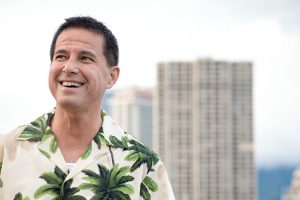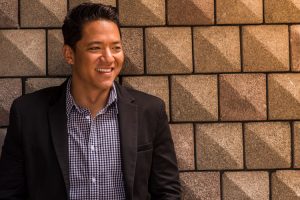HEMIC CEO Marty Welch on getting people back to work—and back to life
Work It
HEMIC CEO Marty Welch on getting people back to work—and back to life
What drew you to the workers’ compensation industry?
Like most of us, I got here by accident. Insurance is a great secret in that it’s an industry you can really get personal fulfillment from. It’s a helpful business—we put people’s lives back together. It’s a very dynamic industry with broad appeal.
What brought you to Hawai‘i?
The first 25 years of my career were with the Wausau Insurance Companies, a Wisconsin-based multi-line insurance carrier who coincidentally wrote the first workers’ compensation policy in the United States. I started in Chicago and later worked at the company headquarters in Wausau, Wisconsin, as well as its offices in San Francisco and Boston.
I left in 2004, about five years after the company was acquired by Liberty Mutual, and went to Employers Insurance Group in Reno, Nevada. I was the president and chief operating officer there before this opportunity came along. Bob Dove, my predecessor and HEMIC’s founding CEO, was approaching retirement after running HEMIC for the first 15 years. They did a national search, and somehow my name got in the mix.
As CEO, I run not just the insurance operation but everything from strategic planning to the investment portfolio to capital allocation, so it’s been a load of fun for me. It was the right thing at the right time for my wife and I, and Hawai‘i has really become home for us.
“Your most important tools are your people. Find the best ones, coach them, equip them, enable them and then get out of their way.”
What were some of the challenges facing the workers’ compensation industry in Hawai‘i before HEMIC was founded?
The mid- to late ’80s were a disruptive time for workers’ compensation, and not just in Hawai‘i. There were a number of states going through serious problems where their rates and benefits were out of alignment, no insurance companies were making money, no employers were satisfied with their coverage and no employees were happy with their care.
Add Hurricane Iniki to the mix and the insurance capital available here dried up. Property insurers didn’t want to play here, multi-line carriers were writing both property insurance and workers’ compensation, there was a shortage of coverage, rates were too high and employees weren’t getting the care they need.
Where does HEMIC fit into the picture?
Because workers’ comp is a statutory requirement, there needed to be some mechanism to cover high-risk employers who couldn’t get coverage on a voluntary basis. In some states that’s through an assigned-risk pool, where designated voluntary market insurers act as servicing carriers. The pool didn’t work well here, so in 1996, the state moved to establish a private mutual company to act as the market of last resort instead of using an assigned-risk pool.
I firmly believe that in a business like insurance, the private market is a much better mechanism. Companies have to compete on price and service quality, and that competition helps hold costs down. While HEMIC may have started as the market of last resort, today more than 90 percent of the premium we write and 98 percent of the policies we issue are ones we compete for. In other words, we’re not the last resort for those customers. We’re their first choice.
In my observation, employers were viewing workers’ compensation as a commodity they’re required by statute to purchase. Part of what HEMIC brought to this market was a sense of obligation on the employers’ part to understand that it’s their kuleana to provide a safe workplace for their employees. By doing that, their employees aren’t going to get hurt, their insurance costs will come down and their business will be more productive. It’s a partnership, not just a commodity insurance policy you’re buying.
The advantage of HEMIC being a mutual company is that our policyholders and owners are the same people. When your customers and shareholders are different, you may sacrifice the long term for the sake of the short term. We’re a private mutual company owned by our policyholders, so our financial interests are aligned with those of our customers.
How has your past experience in the business affected your vision or leadership at HEMIC?
I think there’s wisdom that comes with experience, but I’m not sure experience is all you need. I’ve been in this business for over 35 years, working in multi-line, multi-state companies, but just because something worked well on the mainland doesn’t mean it’s going to work here.
A certain amount of vision is necessary in this business. Everything’s changing—our business, technology, our customers—we’ve got to come up with solutions that aren’t necessarily within the four corners of a law that was made 100 years ago.
How is your approach and management style similar or different from prior leadership?
It’s not appropriate to compare the two, but I’ll start by saying I don’t think I could’ve done what Bob Dove, my predecessor, did. He came into a situation where there was no money, a new law in a marketplace that was against him and a number of people hoping he’d fail so they could go back to the old way. When I came on board in the 15th or 16th year of the company, we were changing the market-of-last-resort perception that people had of us and becoming a more service-oriented company as opposed to a compliance-oriented organization.
My style is knowing that I can’t do it all myself. I don’t have all the right answers. It’s my job to find people who I believe are the best at what they do and enable those people to do their jobs. I believe in a collaborative, trust-oriented organizational culture. I think it’s taken some time to build that, but I think we’re there.
How does that organizational shift relate to HEMIC’s latest advertising campaign?
In the beginning, HEMIC’s advertising was more about name recognition. Later we started taking a humorous approach and using our actual employees. In one of them, we had our CFO, Jason Yoshimi, in a sand trap on a golf course, and the joke was: really bad at golf, really good at workers comp.
Then we decided to answer the question, “So what?” What does that mean to me, the insured? If we’re really good at workers’ comp, then that means you, the employer, can focus on your business. You’ve got enough to worry about—let HEMIC worry about your workers’ comp.
But for our 20th anniversary last year, I wanted to do something different. We’d been making viewers laugh—this one was intended to make them cry. We’re not that stereotypical big, bad insurance company that charges premiums and denies claims. We may issue policies and write claim checks, but what we really do is get injured people back to work. That is why we exist.
A workplace injury isn’t just a physical injury, it’s psychological, mental, financial—we lose our livelihood. We hold up the value of work and help employers run safe, productive businesses. That’s the broader, more triumphant message we tried to get across.
How did you get involved with the Arthritis Foundation?
We often think of arthritis as one of those things you get when you’re old, but it isn’t. Two-thirds of adults who have arthritis are under the age of 50. My grandmother had arthritis her entire life. She had trouble walking to school as a child because her knees hurt so badly and was confined to a wheelchair by the time I knew her. And I have other family members with rheumatoid arthritis, so it’s been in the back of my mind most of my life.
When I arrived here as a new CEO, I knew I wanted to do something that would put me into the community and position my organization as a good public servant. Between that, my family history and the connection between workplace disability and arthritis, the Arthritis Foundation seemed like a natural fit, and I accepted the chairman role about four years ago.
What are some other community partners you work with?
Bob Dove, my predecessor, was a big proponent of insurance and business education, so to leave a legacy for him and honor all he did to found the company, we established an endowed scholarship at the Shidler College of Business—its largest—with the University of Hawai‘i Foundation.
We’re involved in a lot of organizations in the interest of being a good corporate citizen, but one that stands out because it’s industry-related is Kids’ Chance, a nonprofit that provides scholarships to children whose parents were catastrophically or fatally injured on the job.
A year ago, two of my employees were at a workers’ comp disability conference and happened upon the Kids’ Chance table. They came back and started a local chapter, formed the board and got physicians, labor, attorneys and other insurance companies involved. It’s the neatest thing to look around the table and see people who are normally contentious in our business all working together to do something good.
Is there a motto you live by in either your personal or professional life?
Being genuine is better than being powerful. Worrying about what’s coming down the road, looking over your shoulder and not trusting your own people—that kind of power doesn’t succeed. But if you’re genuinely comfortable with who you are, if you know your strengths and what you maybe don’t do as well, then you know what you have to go find in somebody else.
My advice to any CEO would be to hire people who are smarter than you. We don’t have all the answers. My father had a saying: don’t buy cheap tools. Your most important tools are your people. Find the best ones, coach them, equip them, enable them and then get out of their way. That’s how organizations succeed.
About a quarter of your business comes from the construction industry. What’s your perspective on the building industry landscape in Hawai‘i?
The importance of a safe workplace really hits home in a market like this. When unemployment is at 2 percent, the last thing you want is one of your people injured. There’s not enough skilled labor out there. Employers are willing to put a little more effort into creating safe workplaces for their employees because they can’t afford to lose them.
This construction boom will end—they all do—and at that point, it will be a matter of helping those employers as they continue to do other work and ensuring that employees can move on from that job to doing something else.



